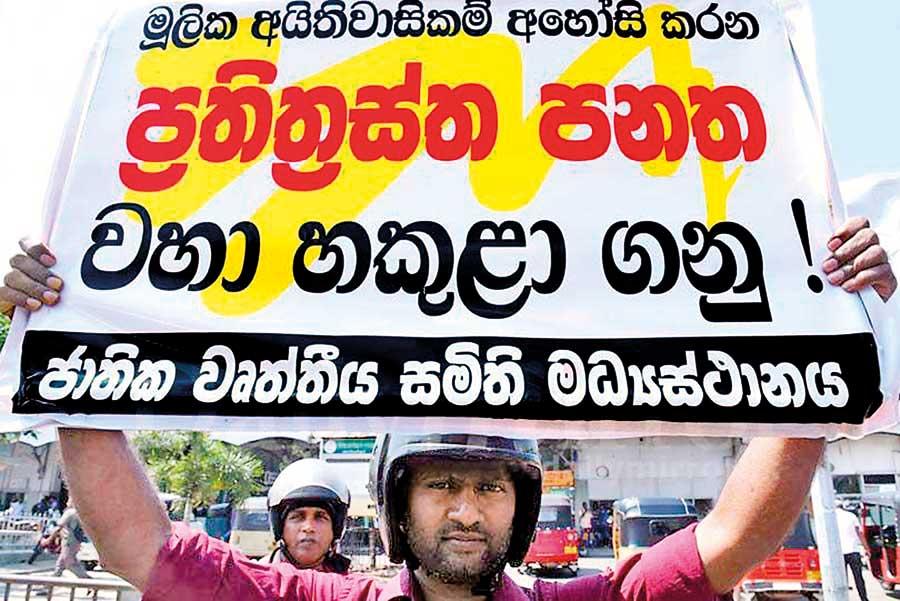Reply To:
Name - Reply Comment

Sri Lanka can and must do better to protect its citizens’ fundamental rights
For forty years, human rights activists have demanded repeal of the Prevention of Terrorism Act (PTA) of 1979. Ultimately it was money, not human rights (the threat of losing GSP+ trade status) that forced Sri Lanka’s hand. A close read of the Anti-Terrorism Act (ATA) reveals it for what it is: lipstick on a pig. It tinkers at the margins without changing what is rotten at its core. Through its overbroad definition of terrorism and backdooring of deradicalization regulations, the ATA vastly expands state power at the expense of citizens’ fundamental rights.
status) that forced Sri Lanka’s hand. A close read of the Anti-Terrorism Act (ATA) reveals it for what it is: lipstick on a pig. It tinkers at the margins without changing what is rotten at its core. Through its overbroad definition of terrorism and backdooring of deradicalization regulations, the ATA vastly expands state power at the expense of citizens’ fundamental rights.
Definitional Problems
A major problem with the PTA was its failure to define terrorism. The ATA makes matters worse by defining terrorism too broadly. Any crime consists of two components—a prohibited act and a criminal intent. Both have problems. Starting with the act element, the ATA prohibits “causing serious obstruction . . . with essential services or supplies” (§ 3(2)(f)). That could encompass last summer’s protests or a labour strike. The ATA also prohibits being “a member of an unlawful assembly” for committing a prohibited act (§ 3(2)(l)). Defining a crime as serious as terrorism on group membership alone is deeply problematic given Sri Lanka’s past.
After the Easter Sunday attacks, police arrested R. Mazahima for wearing a dress printed with a ship’s wheel(misconstrued as Dharmachakra) and Ashnaf Jazeem for writing a ‘jihad’ poem (that actually spoke against extremism and violence). The ATA would not prevent these arrests; it defines terrorism to include incitement through words, signs, or visible representations that are “likely to be understood by some or all of the members of the public” as encouraging terrorism (§ 10(1)(a)). While statements must be taken in context (§ 10(4)), do we really think officers would act differently tomorrow? Detainees can say that the image or writing did not express their views or was published without consent (§ 10(5)), but not that it was grossly misconstrued.
Gathering or sharing “any confidential information” can amount to an independent offence, raising threats to media freedom despite the carveout for information “published in good faith with due diligence for the benefit of the public or in the national interest” (§ 9).The ATA bans sending a “terrorism publication,” which includes anything that could be viewed as useful for a terrorist offence (§ 11(1)(e), (3)(b)). Third party platforms that provide “a service to others that enables them to obtain, read, listen to or look at a terrorism publication” also face liability (§ 11(1)(d)).
The mental state element is even worse. The ATA bans acts committed with the intent to compel action by the state, any other government, or an international organization (§ 3(1)(b)). It bans acts committed to incite discrimination, hostility, or violence (§ 3(1)(e)).While the latter sounds fine on paper, the subversion of the ICCPR Act of 2007raises obvious concerns. Racist monks who terrorize minorities will incite violence with impunity under the ATA while the state arrests minorities for harming majority feelings.
The ATA punishes not only direct perpetrators, but also those who abet “any act preparatory to the commission of an offence” (§ 5(1)).There is liability for failure to report or provide information to police (§ 15). In the United States, where I practice, there is generally no duty to report a crime, except for mandatory reporting by teachers, doctors, and social workers of child abuse or neglect. Singapore imposes such a duty under section 424 of its Penal Code, but violators face only six months imprisonment whereas the ATA imposes 7 years and up to a Rs. 500,000 fine(§ 15(b)).
A hypothetical might help put it all together. Imagine that Tamil and Muslim mothers occupy public roadways protesting the years-long detention of their loved ones under the PTA. They intend to press the government to release or charge those detained. Human rights activists join in seeking legal reform and urging the international community to act. After the first day, protesters meet to share ideas. They post information about this meeting on social media and in local newspapers. Lawyers for PTA detainees attend and give updates about their clients’ cases. Some curious locals attend, while others stay home. Media outlets cover the meeting and the protests. How many potential crimes have been committed under the ATA, and by whom?
The ATA is so comically broad that any communal gathering faces the prospect of being deemed a terrorism offence, thereby justifying abandonment of due process safeguards. In a country where existing counterterrorism laws have been abused to trample fundamental rights for minority communities, the ATA’s definitional overbreadth makes things worse, not better. Everything flows from this definitional problem. Positive procedural changes are small comfort at the margins with vastly more people facing arbitrary detention under the proposed ATA.
Deradicalization
Less publicized is how the ATA backdoors banned deradicalization regulations to the PTA that were gazetted in 2021. Seeing alarming parallels to China’s Uyghur reeducation camps, the EU Parliament recommended suspending GSP+ again (for the first time since the war) based in part on these regulations. Sri Lankan activists took the matter to court, and the Supreme Court stayed their implementation. The ATA revives these regulations by giving the Attorney General authority to defer criminal proceedings and recommend rehabilitation of the accused(§ 71, 77). Rehabilitation in turn would be administered by the new Bureau of Rehabilitation, created by the Bureau of Rehabilitation Act of 2023.Through these twin bills, the government attempts an end to run around the Supreme Court by incorporating a deradicalization bill into the ATA’s framework.
This would have drastic real-world consequences. Masses of ordinary Muslims were detained after the Easter Sunday attacks, like masses of Tamils detained after the civil war. The ATA gives the Attorney General power to defer an indictment and recommend rehabilitation, reparations, apology, and community servicein ordinary cases (§ 71(1)-(3)). As to persons who have yet to be charged with a crime, on what legal basis may the state order rehabilitation, payment of compensation, or other penalties? Similar powers are bestowed to the Attorney General after charges are filed. The ATA permits the chief prosecutor “at any time before the judgement is given by the High Court” to withdraw the indictment and impose rehabilitation, payment of reparations, and community service in lieu of trial (§ 77(1)-(3)). Once the indictment is withdrawn, on what legal basis may the state order an uncharged suspect to forego liberty and pay reparations?
A poor family cannot withstand loss of their sole breadwinner for three months of detention or 12 months of remand custody, much less years waiting for a case to reach trial. Even if innocent of any crime, the prospect of freedom is too great to forego. Detainees will opt for rehabilitation whether or not they have a strong defense. Viewed in conjunction with its definitional problem, the ATA’s rehabilitation scheme is abusive and coercive. Sri Lanka can and must do better to protect its citizens’ fundamental rights.
Mytili Bala is a California attorney who has been an advisor to the Women’s Action Network